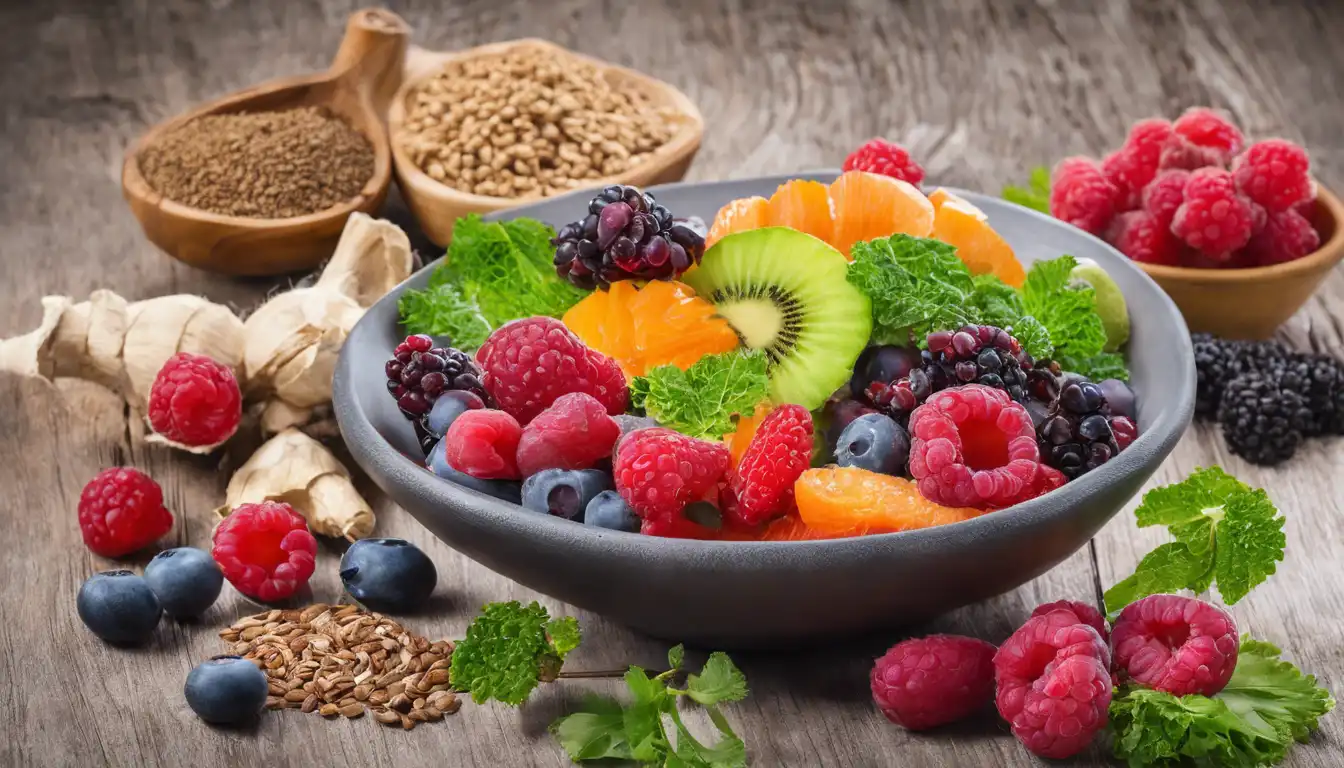In the pursuit of optimal health, the role of immunity cannot be overstated. As the body’s natural defense system, immunity guards against diseases and infections, showcasing the importance of maintaining a strong immune response. With the myriad types of immunity, including innate immunity, humoral immunity, and cell-mediated immunity, understanding how to bolster these defenses is paramount. This article delves into the realm of immunity boosting foods, shedding light on how certain superfoods can enhance health and fortify the body’s immunity booster capabilities.
Highlighting five key superfoods—berries, leafy greens, citrus fruits, yogurt, and garlic—this article provides a comprehensive guide to augmenting your diet for an immunity boost. Berries, packed with antioxidants, aid in combating oxidative stress, while leafy greens supply vital nutrients for immune function. Citrus fruits, rich in Vitamin C, are known for their immunity booster foods properties, enhancing humoral immunity. Yogurt, with its probiotics, supports the gut’s role in innate immunity, and garlic, a potent immunity booster, strengthens cell-mediated immunity. Together, these foods offer a holistic approach to enhancing both innate and humoral immunity, crucial for maintaining overall health and well-being.
Berries

Berries Nutritional Profile
Berries, such as blueberries and blackberries, are not only delicious but also packed with essential nutrients. A half-cup serving of blueberries provides 42 calories, 0.5 grams of protein, 11 grams of carbohydrates, 2 grams of fiber, 7 grams of sugar, and 7 mg of Vitamin C [1]. Similarly, blackberries in a half-cup serving offer 31 calories, 1 gram of protein, 7 grams of carbohydrates, 4 grams of fiber, 3 grams of sugar, and 15 mg of Vitamin C [1]. These nutritional values highlight berries as a low-calorie food rich in fiber and vitamins.
Berries Immune-Boosting Properties
Berries are a powerhouse of antioxidants and polyphenols, which are vital for reducing inflammation and enhancing the immune system. The antioxidants found in berries, such as anthocyanins, ellagic acid, and resveratrol, not only protect cells but also reduce the risk of disease [2]. Regular consumption of berries can improve immune response and reduce markers associated with chronic diseases like heart disease, cancer, and diabetes [1][2]. Furthermore, flavonoids present in berries, like the anthocyanin in blueberries, have been shown to boost immune system functionality and may decrease the likelihood of acquiring upper respiratory tract infections [3].
Best Ways to Incorporate Berries
Incorporating berries into daily meals is both easy and beneficial. They can be added to breakfast cereals, oatmeal, or yogurt to enhance flavor and nutritional value [1]. Berries also make a great addition to salads, providing a sweet contrast to savory flavors, or can be used in smoothies for a refreshing, nutrient-packed drink [1][4]. For those looking to explore culinary creativity, berries can be included in desserts, sauces, or even savory dishes like salads and meats, offering a unique flavor profile and boosting overall meal nutrition [4].
Leafy Greens

Leafy Greens Nutritional Profile
Leafy greens like spinach, kale, and arugula are nutritional powerhouses, packed with vitamins and minerals essential for overall health. They are especially rich in vitamins A, C, K, and minerals like iron and calcium. For instance, a cup of raw kale provides a significant amount of the daily value for vitamin K, essential for bone health and blood clotting [5]. These greens are also low in calories and high in fiber, which helps in maintaining a healthy digestive system [6].
Leafy Greens Immune-Boosting Properties
The immune-boosting properties of leafy greens are primarily due to their high antioxidant content, including flavonoids and carotenoids, which help reduce inflammation and protect against disease. For example, the beta-carotene found in kale supports the immune system and enhances skin and eye health [7]. Additionally, the vitamin C in spinach not only boosts the immune system but also acts as a powerful antioxidant protecting the body against free radicals [3].
Best Ways to Incorporate Leafy Greens
Incorporating leafy greens into one’s diet can be both delicious and versatile. They can be enjoyed raw in salads, blended into smoothies, or cooked in a variety of dishes. For a quick and nutritious start to the day, adding spinach or kale to a morning smoothie can provide a significant nutrient boost. Alternatively, sautéing Swiss chard with garlic and olive oil makes for a flavorful and healthy side dish. For those looking to add more greens to their diet, experimenting with recipes like kale chips or spinach pesto can be a fun and tasty way to do so [8].
Citrus Fruits

Citrus Fruits Nutritional Profile
Citrus fruits, such as lemons, oranges, and grapefruits, are celebrated for their refreshing taste and significant health benefits. They are naturally low in calories, with a small orange containing only 45 calories, and are devoid of fat and sodium [9]. These fruits are excellent sources of dietary fiber, important for digestive health; for instance, one orange provides 2.3g of fiber [9]. Citrus varieties are also rich in vitamin C, essential for immune function and skin health, with a single orange offering 78% of the daily recommended value [9].
Citrus Fruits Immune-Boosting Properties
The immune-boosting properties of citrus fruits are largely attributed to their high vitamin C content, which is crucial for the repair and growth of tissues in all parts of the body. Vitamin C also enhances the absorption of iron from plant-based foods and improves the immune system’s ability to protect against infections [10]. Citrus fruits contain a host of other beneficial compounds, including flavonoids, which have anti-inflammatory and antioxidant properties, potentially reducing the risk of chronic diseases such as heart disease and cancer [9]. Regular consumption of citrus can strengthen the heart’s health and aid in the management of healthy blood pressure levels due to their potassium content [9].
Best Ways to Incorporate Citrus Fruits
Integrating citrus fruits into daily diets is straightforward and versatile. They can be consumed alone as a refreshing snack or added to various dishes to enhance flavor and nutritional value. Adding slices of oranges or grapefruit to salads can introduce a sweet and tangy flavor, while the juice of lemons and limes makes an excellent dressing for salads or seafood [10]. For a hydrating start to the day, blending some citrus fruits into a morning smoothie can provide a vibrant taste and a boost of energy. Moreover, citrus fruits are easy to store and can be kept at room temperature, making them a convenient snack option [10].
Yogurt

Yogurt Nutritional Profile
Yogurt, particularly Greek yogurt, is a nutrient-dense food offering a variety of essential vitamins and minerals. It is notably high in calcium, providing almost half of the daily requirement in just one cup [11]. Greek yogurt stands out with its high protein content, offering more than double the protein of regular yogurt while being low in carbohydrates and sugar [12]. Additionally, it contains beneficial probiotics like Lactobacillus and Bifidobacteria, which enhance gut health and immune function [11].
Yogurt Immune-Boosting Properties
The immune-enhancing qualities of yogurt are largely attributed to its probiotic content. Probiotics help maintain a healthy gut flora, which is crucial for a robust immune system [11]. Regular consumption of yogurt, especially varieties fortified with vitamin D, can bolster immune health, reducing the likelihood of infections and even the severity of common illnesses like the cold and flu [11]. Moreover, the trace minerals such as zinc, selenium, and magnesium found in yogurt play vital roles in immune system functionality [11].
Best Ways to Incorporate Yogurt
Incorporating yogurt into one’s diet is versatile and beneficial. For a quick, nutritious breakfast, mix yogurt with fruits and granola [13]. Yogurt can also replace higher-calorie ingredients like mayonnaise or sour cream in recipes, offering a healthier alternative without sacrificing flavor [12][13]. Additionally, using yogurt in smoothies or as a base for dips and sauces can increase the nutritional value of everyday meals while providing a creamy texture and rich flavor [13].
Garlic

Garlic Nutritional Profile
Garlic, a member of the Allium family, is not only a staple in cooking but also a powerhouse of nutrition. Each clove of garlic is packed with vital nutrients, including manganese, vitamin B6, vitamin C, and selenium, and despite its small size, it is incredibly nutritious [14][15]. A single clove contains significant amounts of these nutrients, contributing to its reputation as a superfood [14].
Garlic Immune-Boosting Properties
The health benefits of garlic are extensive, particularly its effects on the immune system. Allicin, the compound responsible for garlic’s pungent odor, is also credited with providing its immune-boosting properties. This compound helps fight inflammation and infection, making garlic a formidable foe against common illnesses like the cold and flu [16][17]. Studies have shown that garlic enhances the disease-fighting response of white blood cells by producing protective cytokines and enhancing antioxidant defenses [18][17]. Additionally, aged garlic extract has been shown to reduce the severity and duration of cold and flu symptoms [14].
Best Ways to Incorporate Garlic
Incorporating garlic into the diet can be both delicious and beneficial. It can be used raw in dressings and salsas to preserve its health benefits or cooked into stews, curries, and pasta dishes to enhance flavor [15][19]. For those looking to maximize its health properties, adding minced raw garlic to dishes just before serving can be particularly effective. Alternatively, garlic can be roasted to create a milder, sweeter flavor that can be enjoyed on its own or added to recipes [16].
Conclusion
Through a detailed exploration of immunity-boosting superfoods, this article has illuminated the pivotal role that diet plays in enhancing our health and fortifying our bodies against diseases. The highlighted superfoods—berries, leafy greens, citrus fruits, yogurt, and garlic—each bring unique benefits to the table, from their rich nutrient profiles to their immune-strengthening properties. By incorporating these foods into our daily diets, we not only cater to our body’s nutritional needs but also bolster our immune system’s ability to ward off infections and maintain overall well-being.
The journey towards optimal health is multifaceted, with nutrition playing a key role. The superfoods discussed offer a holistic approach to health maintenance, emphasizing the synergy between diet and immunity. As we adapt our diets to include these nutrient-dense foods, we lay the foundation for a stronger, more resilient body. Moreover, the broader implications of these dietary choices underscore the importance of conscientious eating habits for long-term health benefits. While this article closes, the conversation on health and nutrition is ongoing, and incorporating these superfoods into your diet is a step towards nurturing a healthy, vibrant life.
FAQs
What are five foods known to enhance immune system function?
Five foods that are particularly effective in boosting your immune system include:
- Citrus fruits: These are high in vitamin C, which is crucial for maintaining a robust immune system.
- Oats: Known for their beneficial properties.
- Sweet potatoes: Rich in nutrients that support immunity.
- Garlic: Known for its powerful immune-enhancing properties.
- Yogurt: Contains probiotics that help in maintaining a healthy gut flora, which is essential for a strong immune system.
Can you list five exceptional superfoods?
Here are five superfoods that are both practical and potent:
- Cinnamon: This spice is not only flavorful but also packed with antioxidants, reduces inflammation, and enhances insulin sensitivity.
- Blueberries: Known for their high antioxidant levels.
- Avocados: Rich in healthy fats and nutrients.
- Salmon: A great source of omega-3 fatty acids.
- Sweet potatoes: Nutrient-dense and beneficial for overall health.
Which foods are known to supercharge the immune system?
Foods that are particularly good for boosting the immune system include:
- Blueberries: Their antioxidant properties help enhance immune function.
- Dark chocolate: Contains antioxidants.
- Turmeric: Known for its anti-inflammatory effects.
- Oily fish: Rich in omega-3 fatty acids.
- Broccoli: Packed with vitamins and minerals.
- Sweet potatoes: Nutrient-rich.
- Spinach: Full of essential nutrients.
- Ginger: Has immune-boosting properties.
What is considered the top booster for the immune system?
Vitamins B6, C, and E are vital for immune support. A well-balanced diet typically provides all these essential nutrients, making supplements unnecessary. Foods rich in these vitamins include:
- Eggs: Good source of vitamin B6.
- Bell peppers: High in vitamin C.
- Spinach: Rich in vitamins C and E.
- Almonds: A great source of vitamin E.
References
[1] – https://www.webmd.com/diet/health-benefits-berries
[2] – https://www.healthline.com/nutrition/11-reasons-to-eat-berries
[3] – https://www.medicalnewstoday.com/articles/322412
[4] – https://www.superberries.com/7-super-ways-to-add-berries-to-your-diet
[5] – https://www.healthline.com/nutrition/leafy-green-vegetables
[6] – https://www.happyfamilyorganics.com/learning-center/article/how-to-include-more-dark-greens-in-your-daily-diet/
[7] – https://www.lifespan.org/lifespan-living/foods-boost-your-immune-system
[8] – https://www.hgtv.com/lifestyle/entertaining/11-tasty-ways-to-eat-more-leafy-greens
[9] – https://www.health.com/nutrition/citrus-fruit-health-benefits
[10] – https://www.mayoclinichealthsystem.org/hometown-health/speaking-of-health/boost-your-senses-with-citrus-fruits
[11] – https://www.healthline.com/nutrition/benefits-of-yogurt
[12] – https://blog.ochsner.org/articles/15-creative-ways-to-enjoy-greek-yogurt
[13] – https://tiogaopp.org/creative-ideas-for-adding-yogurt-to-your-diet/
[14] – https://www.healthline.com/nutrition/11-proven-health-benefits-of-garlic
[15] – https://www.eatingwell.com/benefits-of-garlic-8418100
[16] – https://health.clevelandclinic.org/6-surprising-ways-garlic-boosts-your-health
[17] – https://www.healthline.com/nutrition/garlic-fights-colds-and-flu
[18] – https://www.ncbi.nlm.nih.gov/pmc/articles/PMC4417560/
[19] – https://www.plantoeat.com/blog/2012/10/ten-ways-to-eat-raw-garlic-every-day/





